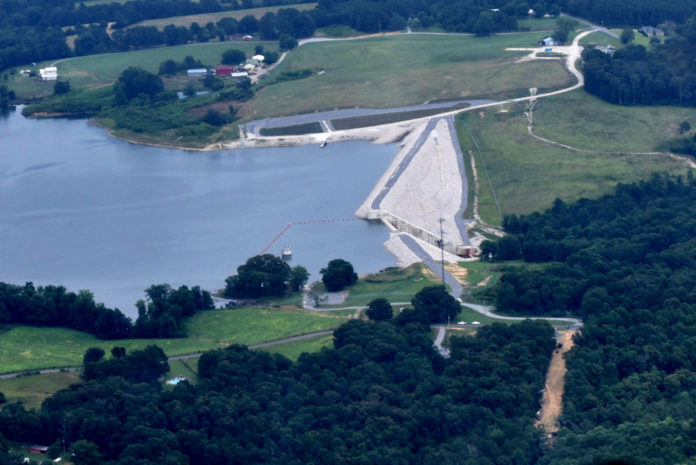CULLMAN, Ala. – Earlier this year, the City of Cullman quietly concluded a six year-long lawsuit against the construction company and engineers who built the dam that created the Duck River Reservoir, Cullman’s newest municipal water supply, following Lake Catoma. According to a statement drafted by City Attorney Roy Williams and issued by the Cullman Economic Development Agency:
“The effective date of the settlement is March 14, 2023. As a result of the settlement, the Cullman Utilities Board received cash payments of $6.55 million plus complete dismissal with prejudice of a counterclaim filed against the Board by the contractor (ASI) and its performance bond surety (Western Surety) in which they sought to require the Board to pay them additional amounts of more than $3 million. The amount of the counterclaim against the Board had already been reduced through the litigation from an original claim of over $6 million.
“Some retrofit work has already been completed, such as extensive coring and grouting at the spillway gravity walls, complete restoration and retrofitting of the dam’s electrical systems and connected equipment components, and the installation of additional instrumentation to monitor the health of the dam. Other work that is still under review, development, and Consideration includes: repairs of concrete cracks at the top of the dam’s spillway (called the Ogee Crest); adding supplemental wave protection at the tops of the earth embankments; retrofitting of uplift pressure relief wells; and potentially retrofitting some drive train components of the intake tower gates.
“Some of this additional work may begin within the next year but will likely be spread over a number of years depending on a number of variables, including costs, seasonal variations (such as wet season versus dry seasons), and further recommendations of consultants.”
Mayor Woody Jacobs told The Tribune, “Personally, and from a Utilities Board standpoint, we’re glad to bring this to an end. It’s taken quite a bit of time; we learned a lot through the process, and we’re moving forward with the dam. The dam is not unsafe or anything like that. There’s just some issues that needed to be resolved through the construction process. We worked through those, and we’re ready to move forward.”
Purpose of the dam and reservoir
According to a document from the Utilities Board of the City of Cullman supplied to The Tribune in 2017, “The purpose of the Duck River Dam is to create an approximately 640-acre reservoir that will serve as a raw water source.”
Cullman Economic Development Agency Director Dale Greer told The Tribune, “(The) purpose was to construct a dam to create a reservoir to impound water to serve as backup source and future supply for the area. Previous engineering studies had indicated Lake Catoma was not sufficient to continue to meet the water supply needs of the residential, commercial, industrial and agricultural needs of Cullman County. During the 2006 drought Lake Catoma was down 26 feet below full pool and the lake was not sufficient to meet our need for another 60 days. Even the most doubting individuals saw the forecast of a looming water shortage in Cullman County was accurate without a new supply source. The community growth in the past 10 years would imply our water needs will continue to grow.”
An intake tower near the dam draws water from the reservoir to be pumped out to the treatment plant on Highway 278 east of the city for conversion to drinking water via a pipeline system between the dam and plant.
2015 flood reveals flaw in dam
A flood on Christmas Day 2015 put the dam to its first major test of strength and, unfortunately, it did not fare well. “At that time,” according to papers filed by Cullman City Attorney Roy Williams as part of the 2017 lawsuit, “a far greater than anticipated flow of water from the reservoir into and through the concrete portion of the dam was first observed (‘Excessive leakage’). Much of the excessive leakage flows into and through the gallery.”
The gallery is an internal access thoroughfare that allows inspections and repairs to be made inside the dam. It was later found that water had risen high enough inside the dam to contact and damage electrical wiring, leading to a shutdown of the electronics that control the dam’s gates and valves.
In July 2017, Williams, on behalf of the Utilities Board of the City of Cullman, filed suit against CH2M Hill Engineers, Inc., ASI Constructors, Inc. and Western Surety Company for deficiencies discovered in the Duck River Dam. CH2M Hill designed the dam, and ASI built it; Western Surety issued ASI’s required performance bond, guaranteeing the successful completion of the project.
ASI asserted that the leakage was due to deficiencies in CH2M’s design. CH2M, in response, defended its design and contended that the problem was with ASI’s construction. Western Surety declared that the bond it issued did not include corrective work to the dam, therefore it had no liability in the matter.
The City’s statement concluded:
“The reservoir can supply as much water as needed on a daily basis. The water treatment plant uses water both from Lake Catoma and Duck River depending on the quality of the water at any given time (choosing the lake that is least costly to treat). The current daily use is between 10 and 12 million treated gallons a day and both lakes have the capacity to provide that amount and more. Duck River addition has made Cullman County drought resistant and will provide for growth for 50-100 years to come.
“As to the value of Duck River you only need to read about the water shortage in Arizona, New Mexico, and California to understand the value of Duck River and the long term vision of the leaders as far back as 1990’s when the project started to the present.”
Copyright 2023 Humble Roots, LLC. All Rights Reserved.




























